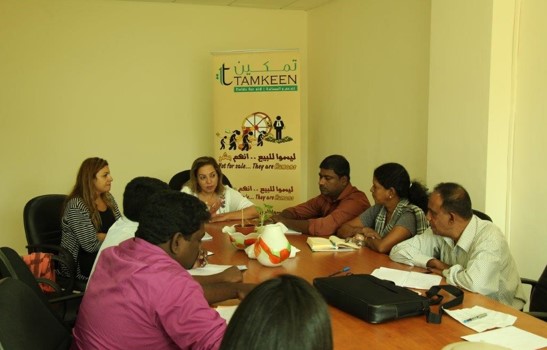2015
 Chairman, PREDO, Nuwara Eliya, Sri Lanka
Chairman, PREDO, Nuwara Eliya, Sri Lanka
[Account of Mr. Michael Joachim, Chairman, PREDO (Sri Lanka), who was part of the group that visited Jordan during the first week of October 2015].

Two teams of SDC partner representatives visited Jordan and Lebanon to acquire first-hand knowledge and experience of the situation of Sri Lankan migrant workers, especially domestic housemaids. A representative of the Sri Lanka Bureau of Foreign Employment (SLBFE) also joined each of the groups. Both groups met and discussed with the respective Sri Lankan Ambassador and officials in each of the countries, along with religious organizations, representatives of the Recruiting Agents Association, trade unions, women’s organizations looking after the interest of migrant women workers, legal aid organizations, lawyers, domestic workers solidarity networks, the Criminal Investigation Department in charge of human trafficking, representatives of the ILO and SDC and other relevant stake holders.
The visit enabled the groups to gain a wealth of knowledge and understanding of the real situation in the two countries, the relevance of pre-departure advice given to the migrants locally, and how migrants can use this information during their stay overseas. Some of the important learnings appearing below could be considered as recommendations:
- Migrants expect better quality and friendly service from Sri Lankan embassies. Therefore, embassy staff need to be trained not merely as diplomatic staff, but as staff who are able and skilled enough to handle the issues of migrants in a manner which is in the best interest of the migrants and which upholds the reputation of the country.
- The psychosocial and legal support services at the Embassy need to be further strengthened.
- Some of the churches in both countries render valuable service to migrants by providing psychosocial support and other assistance. Thus, the Buddhist temples, churches, Hindu temples and mosques in Sri Lanka should play a vital role in preparing migrant workers and their families prior to their departure.
- It was learned that some embassies receive migrant workers upon their arrival in the country of destination (eg: Philippines) and then accompany the migrant worker when he/she joins the employer. This arrangement greatly reduces the risk for the migrant workers. Therefore, the possibility of adopting this system by the Sri Lankan embassy needs to be studied further.
- Awareness creation on migrant rights is vital and it was revealed that domestic workers who know their rights and duties enjoy better situations and are able to defend as well as protect themselves.
- Domestic workers need to be sufficiently prepared and strengthened to face the psychosocial shock and trauma they may face in the receiving country and in the workplace. However, this is totally lacking at this time.
- When giving handouts and information to migrants about places where they can obtain support, information should be written in Arabic language so migrants can locate those places by showing the handout to someone in the country of destination.
- Contacts made with local organizations in both countries have enabled SDC partners to build up a closely knit network that helps in solving the issues of the migrant workers.
- Teams were able to see that some migrants have settled permanently and have wilfully severed connections with their families while the families are under the impression that they are lost.
- Bi-lateral agreements between Sri Lanka and each of the receiving countries need to the reviewed regularly to ensure better conditions for migrant workers.
- The Recruiting Agents Associations are prepared to think of adopting ways and means to raise the awareness of employers in order to safeguard the migrant worker industry and to uphold the reputation of the receiving country – this idea needs to be pursued.
There are many more important lessons learnt – and the main outcome of the visit is that SDC partners realized that the strategies currently adopted need to be reviewed and revised, as well as In addition, advocacy initiatives need to be pursued to press for change in policies relating to migrants, especially for domestic workers.
